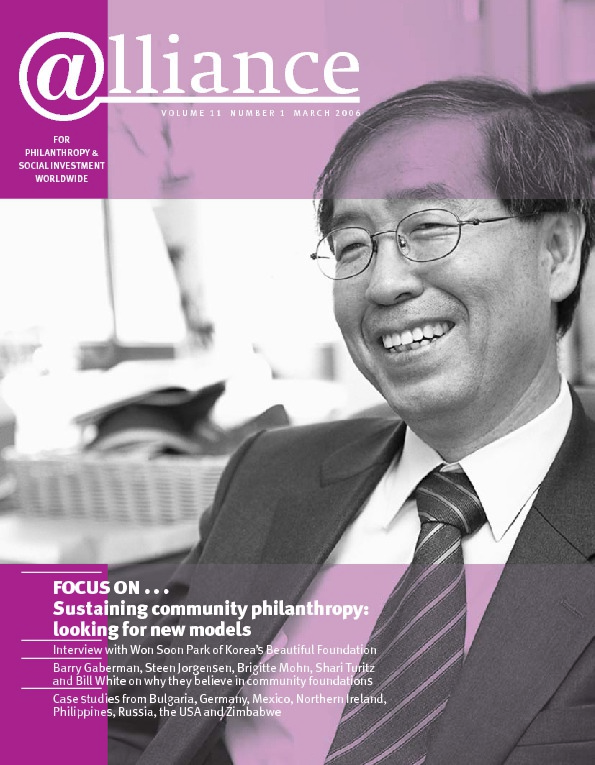Launched in 2005 by the Ford Foundation, the International Initiative to Strengthen Philanthropy (IISP)[1] brings together more established ‘general purpose’ foundations and newer and emerging social justice funds from around the world in an effort to build their financial and programmatic capacity and to enable them to be significant players in the regions in which they work. All are important partners of the Ford Foundation. Over the next two years, IISP will provide them with approximately $100 million in grant and technical support.
The premise of the initiative is that civil society, in order to be seen as independent and authentic, needs domestic philanthropic organizations to seed and strengthen its work. Such philanthropic institutions have the potential to mobilize domestic resources and public support, engage with local governments and businesses, support innovative ideas that could be scaled up, and build community leadership. This is particularly relevant in countries where foreign donors and their agendas are viewed as suspect. In the case of human rights funds and women’s funds, they help build awareness and understanding of the issues themselves.
Two meetings so far
Initiative participants[2] have so far met twice, in Budapest following the European Foundation Centre conference and in Puerto Rico prior to the twentieth anniversary of the Puerto Rico Community Foundation. Sessions at the first meeting focused on developing a mission and vision, operationalizing the mission, and raising funds to meet it. They drew heavily upon expertise from within the group and were complemented by sessions that enabled participants to get to know one another and to provide input into the framework and design of the IISP.
Based on the feedback received after the first meeting and subsequent consultations with participants, the second meeting allowed for a mix of plenary sessions and smaller working sessions. Plenary sessions focused upon broad themes such as the role of foundations in society, the relationship between governments and philanthropy, and social justice philanthropy. Smaller working sessions were more specifically focused and included topics such as the role of the board in fundraising, operationalizing a social justice grantmaking programme, evaluation, mission-focused fundraising, and building endowments. Again, sessions drew on the expertise of the group, but also included external resource people.
Technical support
In addition to biannual meetings, the IISP will provide opportunities for participating foundations to access technical support in areas most relevant to their needs. Funds can be used to retain consultants in areas such as fundraising or governance, to attend conferences or training seminars, or to spend in-depth time with other foundations or resource organizations.
The group will meet again in the summer of 2006 in West Africa. A smaller learning event is being planned for the emerging human rights funds in the spring. A learning agenda is being developed that will address an array of learning needs through a variety of different methods.
An ongoing external evaluation is being conducted by the UK-based CENTRIS. The evaluation has proved critical in ensuring that programme development reflects input and feedback from participants. It thus helps ensure the Initiative’s accountability to participants.
In the longer term, what do participants themselves want? The introductions at the second meeting best captured their hopes and aspirations. They shared a desire to end discrimination and to increase citizens’ voices in democratic processes. They expressed aspirations to advance the cause of human rights and social justice by building or strengthening institutions and networks, by developing local cultures of philanthropy, and by building honest and humble philanthropic institutions that can challenge us to learn, to reflect and to grow.
1 See Alliance Vol 10, No 2, June 2005, p5.
2 African Women’s Development Fund, Arab Human Rights Fund, Bangladesh Freedom Foundation, Brazil Human Rights Fund, Charities Aid Foundation (Russia), Dalit Foundation (India), First Nations’ Eagle Staff Fund (US), Fund for Global Human Rights, Fundación Rostros y Voces (Mexico), India Foundation for the Arts, Kenya Community Development Foundation, National Foundation for India, New Israel Fund, Puerto Rico Community Foundation, Russian Human Rights Fund, South Asia Women’s Fund, Stefan Batory Foundation, and TrustAfrica.
Sushma Raman is Program Manager, International Initiative to Strengthen Philanthropy. She can be contacted at s.raman@fordfound.org



Comments (0)